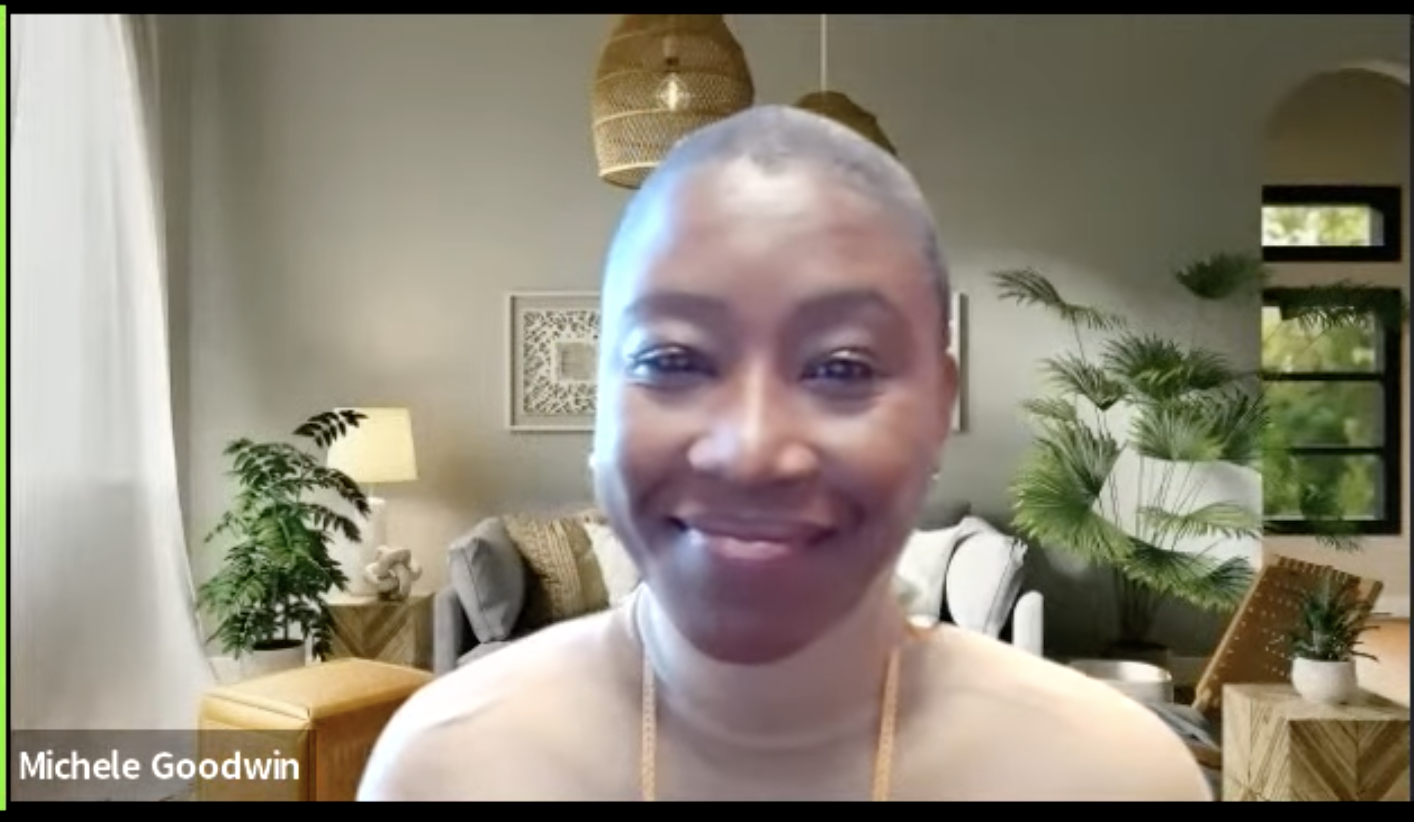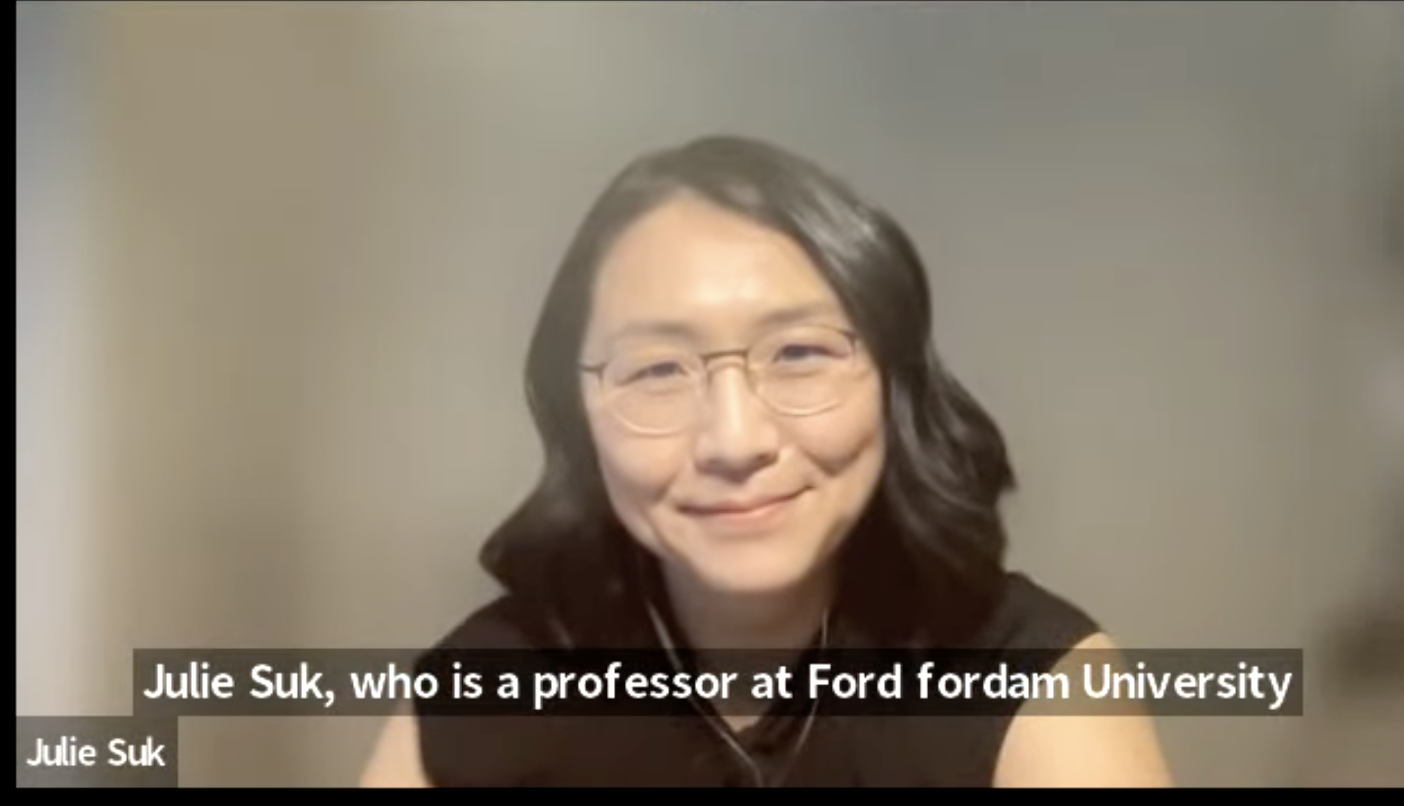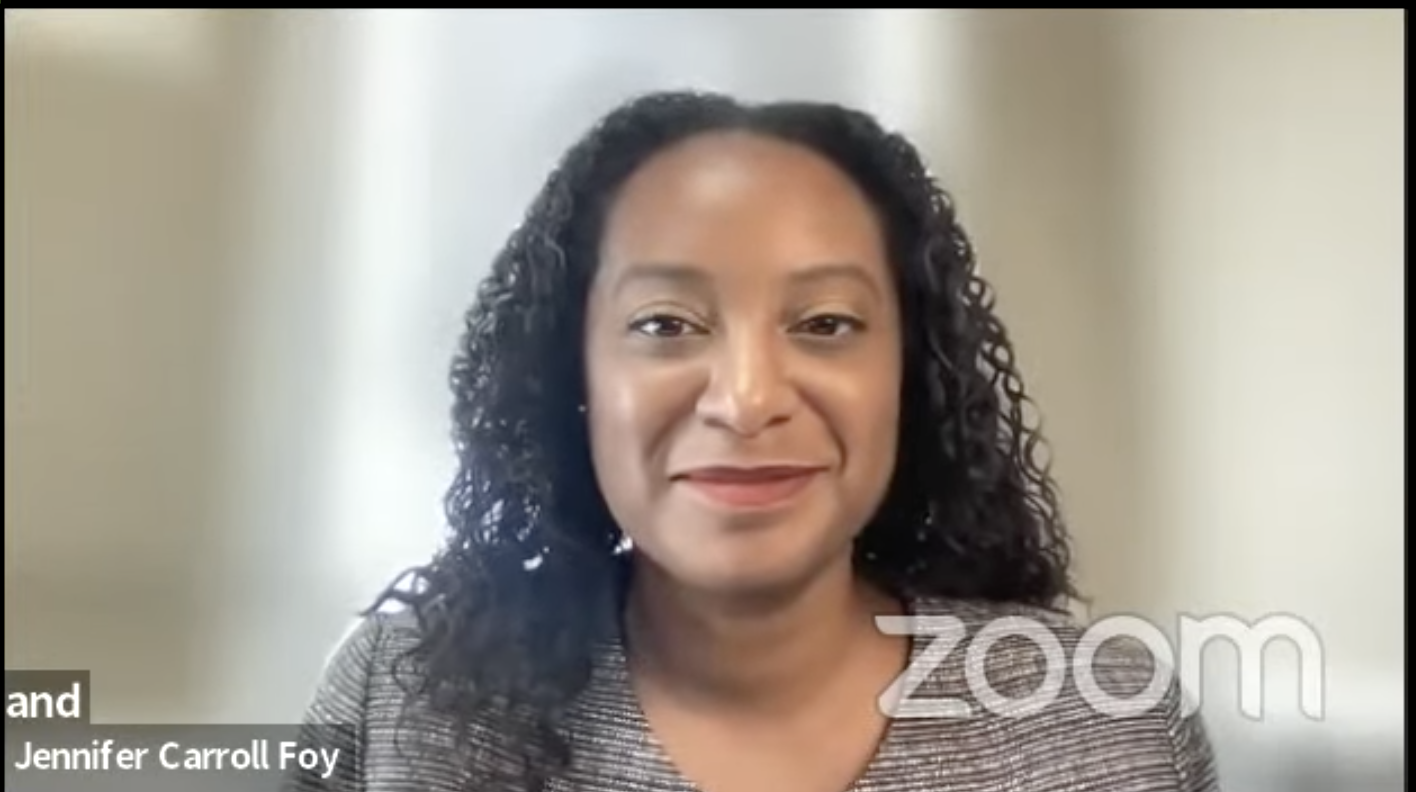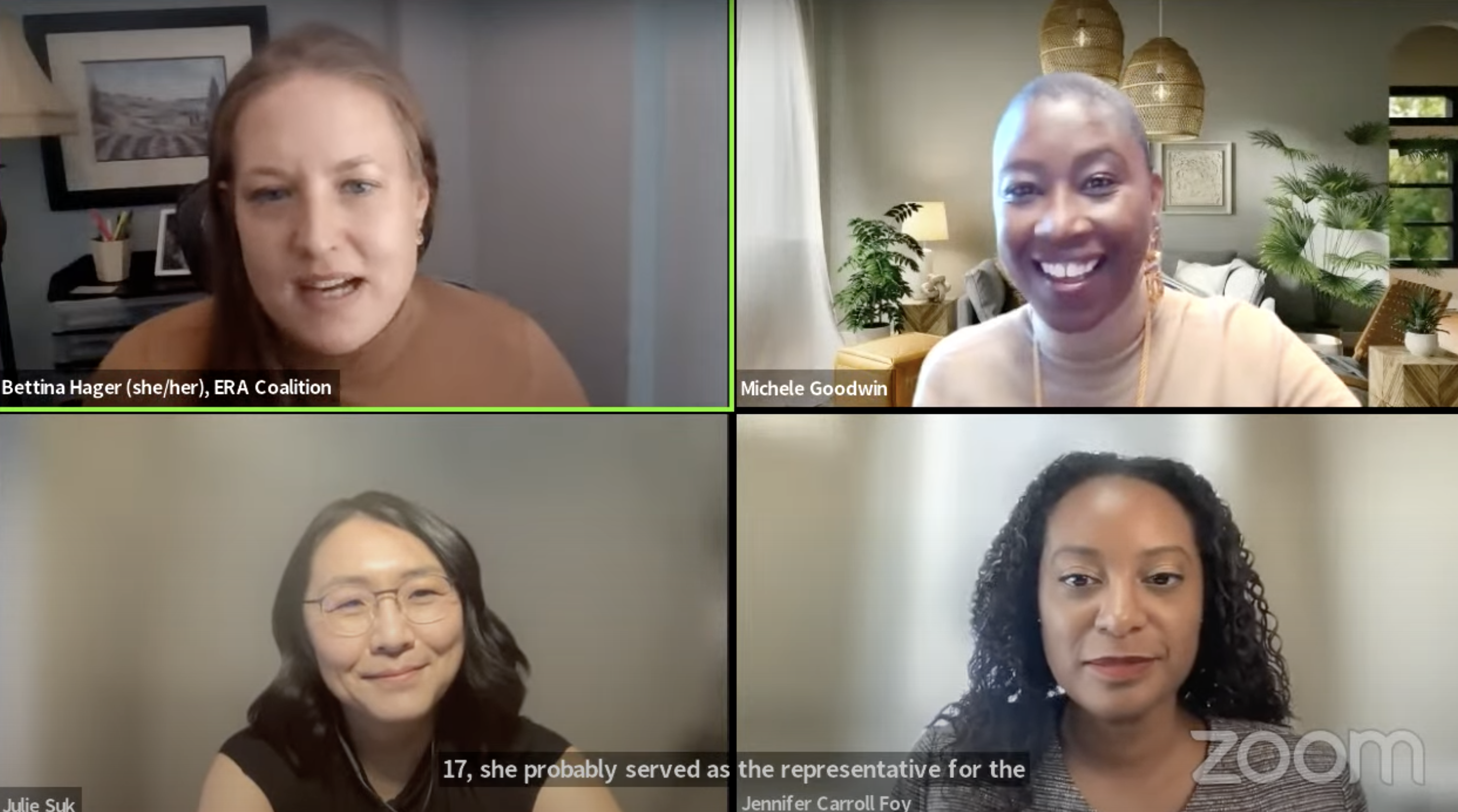Why Young Men in the US Should Pay Attention to and Advocate for the Equal Rights Amendment
July 23, 2024
Equal Rights Amendment Coalition President & CEO Zakiya Thomas welcomed everyone to this month’s town hall discussion, supported by the Harnisch Foundation. Thomas acknowledged that roughly 80% of people in the U.S. think that we already have an Equal Rights Amendment. Thomas exclaimed, “for those of you on this call who know we don’t yet have constitutional equality, you see the uphill battle we have before us of educating the American public on the need for the ERA, and how we can get it across the finish line – that’s where all of you come in. After this town hall, make sure you talk about the ERA with your friends and networks, and how important it is that we get sex equality into the Constitution! And take your values to the polling place with you on election day!”
ERA Coalition’s D.C. Director and Director of Outreach & Partnerships, Bettina Hager, took over to introduce the topic and share just one concrete example of why we need the Equal Rights Amendment: Jessica Lenahan’s story.

Jessica Lenahan is a courageous advocate for justice, and an example of the tragic injustice that happens in the absence of constitutional equality. She was denied justice when the Town of Castle Rock, Colorado’s Police Department, refused to enforce a restraining order against her estranged husband. Despite calling the police department seven times and going to the station twice, no action was taken to return her daughters to safety. As a result, Rebecca, Katheryn, and Leslie’s lives were needlessly cut short that night. Jessica took her case against the Town of Castle Rock’s Police Department all the way to the Supreme Court, which ruled that Jessica had no constitutional right to enforcement of the restraining order.
Jessica continued to pursue justice and won her case before the Inter-American Commission on Human Rights based on international standards with ERA language that is not yet in our own Constitution! She is now working to advocate for the passage of an Equal Rights Amendment so that all women and girls are afforded constitutional rights to protect them against discrimination and violence. In her recorded remarks, Jessica explained “equality means to me that, had female gender been recognized as important in 1999 at the time of my children’s murders, there may have been a different outcome.” A key takeaway from her tragic story is to keep equality in mind when you go to the polls each and every year!
This month’s town hall included an incredible trio of speakers: Dr. Michele Bratcher Goodwin, Julie Suk, and Jennifer Carroll Foy!

Dr. Michele Bratcher Goodwin is a Chancellor’s Professor at the University of California, Irvine and founding director of the Center for Biotechnology and Global Health Policy. She is also a global thought leader and advisor and the host of the popular podcast, On the Issues with Michele Goodwin, at Ms. magazine. Her writings address pressing matters of law, society, and global health. An award-winning author, her publications appear across five books and more than one hundred law review articles, book chapters, and commentaries. Her opinion editorials and commentaries can be found in the New York Times, LA Times, Salon.com, Politico, Forbes, the Christian Science Monitor and other platforms.

Julie Suk, a professor at Fordham University’s School of Law, is an interdisciplinary legal scholar, focusing on women as constitution-makers at the intersection of law, history, sociology, and politics. Her broader research interests include constitutional and social change; antidiscrimination law and its effects on social inequality; women, work, and family; civil litigation as an enforcement mechanism for public law; access to justice, including the past and future role of nonlawyers in solving the civil justice problems of poor and middle-income people; social, political, and legal theory; and law and literature.

Jennifer Carroll Foy ran and won her race for the House of Delegates while pregnant with twins in 2017. She proudly served as the representative for the 2nd District where she carried and passed bills to end pregnancy discrimination, reduce the Black maternal mortality rate, and it was her Equal Rights Amendment resolution that passed making Virginia the 38th and final state needed for ratification. As a former foster parent, public defender, and one of the first women to ever graduate from Virginia Military Institute, a historically all-male college, Jennifer has dedicated her life to public service. She is currently running for state Senate for the 33rd district in Fairfax and Prince William Counties.
Bettina kicked off the discussion, stating that even though the ERA passed Congress 50 years ago, and got the 38th and final required state to ratify in 2020, it is still not published or universally recognized as the 28th Amendment. What do you think the real hold up is, or was? Julie explained that “the hold up is Article 5, and the hold up is actually the Constitution.” A very important part of the hold up story is that in 1972, despite the fact that the House passed the ERA by 96%, the Senate let it die initially.
When the Senate finally passed it, a small group of men insisted on a time limit in the amendment's preamble, forming the compromise that has made it very difficult today to get the ERA within our explicit Constitutional rights. As a result of the time limit, today there’s widespread confusion regarding whether or not the Constitution has really been amended. Michele added “Julie described that so well, and the stalemate we’re in now is in regards to the legal scholars divided on where to go next.” We have pressure on the archivist and on President Biden to publish the amendment, but we are also in this stalemate that we need to progress past.
Bettina posed the next question to Jennifer, asking what it was like to work so hard to ratify the 38th state necessary to include the ERA, without seeing it actually published and enacted within the U.S. Constitution. Jennifer responded that “to have Virginia be that final state was really gratifying, but I just knew that that was going to be where the fight would be renewed…But what these new challenges do for me now is just add fuel to the fire – Virginia was no easy feat, but I’m here to say that there’s no deadline for women’s equality.” Everything we’ve achieved today is because we’ve agitated and we’ve worked, and that is no different from how we will force change in the future as well.

Bettina asked the panelists what they see as the path forward to us seeing the ERA in actuality as our 28th Amendment. Michele jumped in, saying that we can generalize this to recent movements in the Supreme Court, and talk about the ERA in terms of the greater notion of equality and the rule of law.
@MicheleBGoodwin: Seeing how easily our rights can be dismantled in the Court as seen through the overturn of Roe v. Wade earlier this year really underscores how important it is, and how crucial it has become to get an explicit measure of protection, like that protection the ERA
Tweet
But when we look back in history at how changes have been made, how single actors like Harriet Tubman saved countless Black individuals from the depths of slavery when an entire military couldn’t act, how these movements today started with an individual or a small group of women – that provides us hope. We have such an incredible community force of people today working, and we will get it done.
Clarifying, Bettina asked questions regarding some of the skepticism behind the ERA: Do you think we still even need an ERA? Women have the Violence Against Women Act. We have the Lily Ledbetter Fair Pay Act. What are we missing here? Doesn’t the 14th Amendment protect everyone already? What would you say to the individuals making these kinds of arguments?
Jennifer jumped in immediately. "I have to respond initially with what the late Supreme Court Justice Scalia said, ‘certainly the Constitution does not require discrimination on the basis of sex – the only issue is whether it prohibits it, and it doesn’t.’ It was very clear in this moment that yes we have some protections through different amendments and clauses, but definitely not as much as race discrimination which has the highest standard under strict scrutiny, and discrimination against women by the government can be done, but the barrier that they have to overcome is much, much lower. What we’re saying is, this isn’t sufficient, and we want to ensure that we do not have discrimination based upon sex.”
Moving the discussion in a different direction, Bettina asked how the ERA could also be used to pass laws in support of LGBTQ+ and gender non-conforming people and their rights. Michele responded that “the ERA is urgently important and I think we need to think about it within the context of protecting more than women, but also individuals that are nonbinary, people who are trans, people who are LGBTQ+ broadly within the scope of what could come with having an ERA.”
Continuing on, Bettina asked about what impact the ERA will have on how society’s treatment and views, especially for women of color and persons in LGBTQ+ communities. Julie explained, “I think that by accomplishing the removal of the time limit imposed on the ERA, to get the ERA published into the history of our legislation is incredibly important – I think this will happen, and it can then open up the path to more constitutional change."
@JulieCSuk: "Opening up this path is really important not only because of what the ERA brings but because of its hopeful ability to open the way to more constitutional modernization that we actually need, including the inclusion of other marginalized groups.”
Tweet
Finally, Bettina posed the final discussion question: What do you think the people here today watching along with us, or watching on our social media channels can do to help get the ERA added to the Constitution? Michele was quick to say “vote!!” Jennifer added, “absolutely voting." And she continued:
@jcarrollfoy: "Be at the table where decisions are being made. Especially for marginalized people excluded by our Constitution’s current protections, having their own voice in the room will evoke the change that we need going forward.”
Tweet
Before closing out the town hall, audience questions were read aloud to the panelists: Do you think the opposition and/or reluctance in the Senate is solely related to legal issues with state approval not meeting the deadline or is it through resistance to the ERA as an issue? Michele answered, “it’s interesting to think about how the time limit deadline can be used as a proxy for resistance.” Certain Senators definitely seem to get to avoid the question of whether or not they support the ERA and women’s rights by diverting to the issue of the time limit.
Biden promised to codify a person’s right to abortion healthcare into law – can that right be included in an ERA package to be passed, or does it need to be separate because one is an amendment? Julie explained that right now, anything that you propose that does not match the exact text of what was adopted by Congress in 1972 would be a new amendment, and would be considered separate and a start over. Michele continued on, clarifying that the codification of Roe v. Wade is just not the same as ratifying a Constitutional amendment, so it’s a much lower bar to be able to do so and codify, but also holds a much more dramatic tension within the process of governing in our Congress.
And an important reminder: Visit ElectEquality.org to find the candidates for office who support equality before you head to the polls!
Watch the full discussion: